
Learning patience was not an easy lesson.






Michael Douglas, with the voice of one who has endured both triumph and trial, confessed: “Learning patience was not an easy lesson.” These words are simple, yet they thunder with truth. For who among mortals finds patience to be an easy path? To wait, to endure, to bear hardship without breaking—this is not the way of instinct but the way of discipline. We are born eager, hungry for the quick reward, the immediate harvest. But life, in its wisdom, delays the fruit, testing whether we will falter or whether we will grow. Thus, Douglas speaks for all of humanity when he admits that the school of patience is hard, and the tuition is often pain.
The ancients regarded patience not as a small virtue, but as a pillar of wisdom. The farmer who sowed his seeds knew he could not command the rain. The soldier at the gates knew he could not hasten the dawn. The mother raising her child knew that growth came not in days but in years. Patience was the virtue that steadied the soul between hope and despair. Yet it was never easily learned. For the soul rebels against waiting, and the heart resists silence. To acquire patience is to struggle against one’s very self, and in that struggle lies greatness.
Consider the tale of Nelson Mandela. For twenty-seven years he languished in prison, stripped of freedom, denied his people, bound by stone and iron. It would have been easy to surrender to anger, to bitterness, to despair. But he chose instead to forge his patience, to transform the waiting years into a crucible of wisdom. When at last he emerged, he did not come forth as a broken man, but as one tempered like steel, ready to lead a nation into reconciliation. His life echoes Douglas’s truth: learning patience is not easy, but it is the very fire that forges strength.
Douglas’s own path, too, reflects this struggle. As an actor and as a man, he faced illness, setbacks, and the long stretches of uncertainty that fame and fortune cannot shield against. To learn patience in such times is not to passively accept, but to endure with dignity, to hold fast when every instinct cries for resolution. This is why he calls it a lesson—for it is taught not in books, but in the harsh classroom of experience. And though the teaching is bitter, its fruits are sweet: resilience, wisdom, and inner peace.
The meaning of his words, then, is both personal and universal. They remind us that no soul escapes this school. Each of us will face waiting—waiting for healing, waiting for opportunity, waiting for the dawn after a long night of struggle. And in those moments, impatience will tempt us to abandon hope, to force outcomes, or to despair. But if we embrace the hard lesson of patience, we will find ourselves stronger than we imagined, able to endure storms without being shattered.
The lesson for us is clear: do not despise the season of waiting. Instead, treat it as training. When forced to wait, breathe deeply and ask, what strength is being forged in me? When your path seems delayed, remember Mandela, remember Douglas, remember all who bore hardship with courage. Patience is not weakness—it is power held in reserve, endurance clothed in silence. It is the armor of those who walk long journeys without fainting.
So, dear listener, carry these words as a guide: “Learning patience was not an easy lesson.” Expect difficulty, expect struggle, expect pain—but do not turn away. For in mastering this hardest of lessons, you will gain a treasure greater than wealth or fame: the unshakable heart that endures, the calm spirit that waits, and the wisdom to know that time itself is a servant, not a master. And when the fruit finally ripens, it will be all the sweeter for the waiting.






AAdministratorAdministrator
Welcome, honored guests. Please leave a comment, we will respond soon